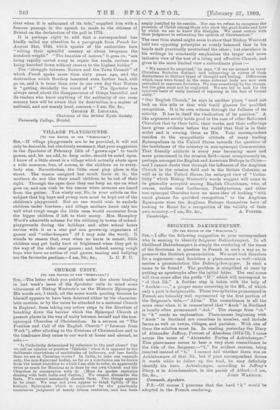SEIGNEUR DAKIMKEMPERT.
LTO THE EDITOR OF TUE " SPECTATOR.".1 SIR,—I offer the following suggestion to your correspondent who is seeking to identify Seigneur Dakimketnpert. In all likelihood Dakimkeuapert is simply the rendering of the name of the Scotsman in question in French in such a way as to preserve the Scottish pronunciation. We must look therefore for a cognomen—and doubtless a place-name as well—which carries a pronunciation like Bakin(g)lcon(g)per. h such a name to be found ? The problem is simplified at once by putting an apostrophe after the initial letter. The real name will thus come after the prefix "D'," which will correspond to "of that Ilk." A further step is taken with the help of " Anchin—," a proper name occurring in the MS., of which only a part is decipherable. These two syllables pronounced in French are tolerably well represented by the first portion of the Seigneur's title,—" Akim." The resemblance is all the more clear when it is remembered that " Auch" in Scotland is locally often pronounced "Ada." The change from "eh" to " k " needs no explanation. Place-names beginning with " Audi " in Scotland are countless in number, and include farms as well as towns, villages, and parishes. With one of them the solution must lie. In reading yesterday the Diary of Alexander Jaffrey, Provost of Aberdeen (1614-73), I came across the name of "Alexander Forbes of Achinhamper." This place-name seems to bear a very close resemblance to the title of the Seigneur,—" k," for evident reasons, being inserted instead of "h." I cannot tell whether there was an Achinhamper of that Ilk, but if your correspondent deems it worth while to follow up the trail, he may definitely identify his hero. Achinhamper, according to Jail ray's Diary, is in Aberdeenshire, in the parish of Alford.—I tun, Sir, &c.,JOHN WARRICK,
Cumnook, Ayrshire.
P.S.—Of course I presume that the hard " k " would be adopted in the French rendering.






































 Previous page
Previous page